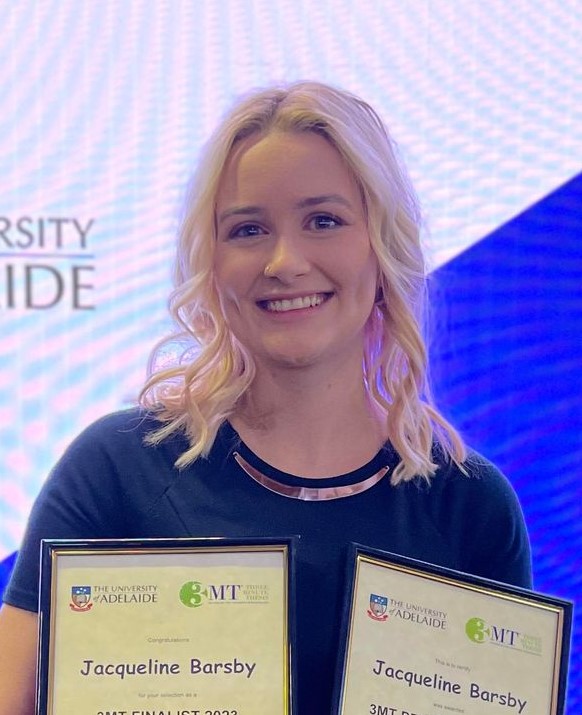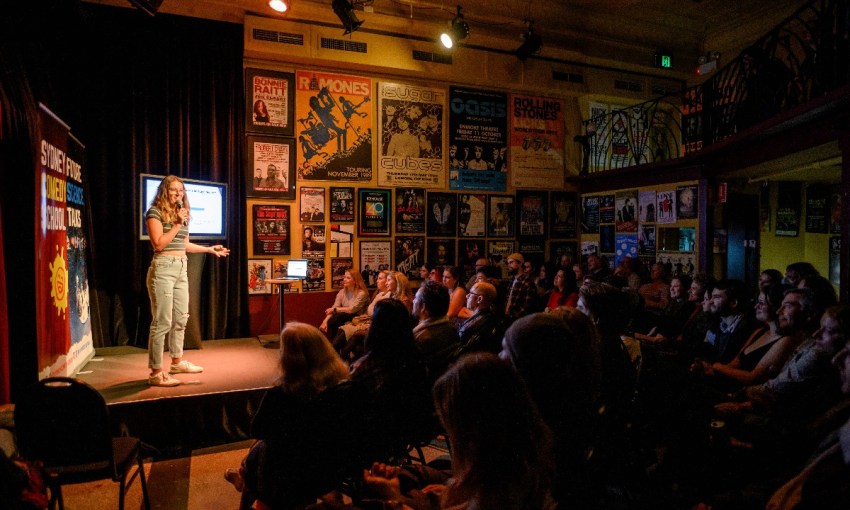Future Science Talks: Comedy Edition is making its South Australian debut at the Adelaide Fringe this year, with 15 different researchers taking to the stage this weekend to inject laughter into often incomprehensibly complex topics.
Science meets comedy in a Fringe show giving Adelaide researchers a platform
Think subjects like genetic engineering, cardiac ultrasounds, wine microbiology or dark matter are anything but funny?
You’d be forgiven in assuming an hour of presentations on these topics might be a little bit dry, but this is the Adelaide Fringe we’re talking about: there’s a twist!
Director of Future Science Talks David Crisante is bringing his winning formula of comedy colliding with science to Adelaide for the first time this weekend, following sold-out shows at the Sydney Comedy Festival, Sydney Fringe Festival and Science Week in 2023.
Future Science Talks: Comedy Edition has a simple premise: throw a scientist on stage to translate often confusing technical jargon into a witty, comprehensible mini-presentation.
Running from Friday 23 February to the following Tuesday, the comedy nights at The Jade will see 15 Adelaide-based scientists perform comedic alchemy as they dive deep into their field of research.
The topics are wildly disparate: on Friday, University of South Australia research fellow Dr Felicity Braithwaite will make light of pain (and placebos). On Saturday, Emily Filmer from the University of Adelaide will discuss dark matter, while on Sunday myths about superfoods will be debunked by another University of Adelaide researcher Jacqueline Barsby.
The show was born from regular science talks in pubs that Crisante would present in Sydney. He tells CityMag he was “taken aback by the public’s interest in hearing what people in science had to say”.
“When people think about entertainment, they don’t really see scientists as being part of that mix,” he admits.
“The main thing that we’re trying to do is not just train scientists, but get the public to connect with science and scientists.
“A lot of people, when they leave [the show], they have a really strong understanding of the science.”
He says the format helps scientists knuckle down on explaining their research in layman’s terms: “because with comedy, you can’t make someone laugh unless they understand what you’re saying”.
“Come for laughs, but you’ll leave with a bit of learning which is exciting. It’s fun to see not just the growth of the audience but the scientist as well.”
The programme is for early-to-mid-career professionals in science and research, and previous iterations of the event interstate have seen researchers present on topics as varied as emojis to toilets in developing countries.
It’s also proving popular with women, who make up the bulk of those presenting at the Adelaide edition of Future Science Talks.
“In comedy, I struggle to get women into my shows,” says David, “that’s despite a lot of women doing training with us.”
“In the science world – I don’t know why this is the case – but a lot of women at the moment seem to want to put their hand up.”
One of the women presenting this weekend is Jacqueline Barsby, whose research speciality is superfoods.
Her presentation – Superfood Myths – will take the audience through misconceptions about superfoods.
“I’ve learned that the definition is so vague… there’s no scientific definition [for superfoods],” she says.
“Pretty much anything can be a superfood, and my party trick is that I can justify – with the really loose guidelines – how any food can be a superfood.”
Her statement got this reporter asking: even chocolate?

Superfood superhero Jacqui.
“Even chocolate,” she says.
“Even chocolate is easily a superfood. It’s got really good antioxidants; it’s got high levels of calcium.
“My other party trick is with KFC – because one of the ‘superfood’ definitions that’s widely accepted is a food that’s high in any micronutrient, and sodium is a micronutrient, so it’s technically a superfood by definition, right?”
Jacqueline says her mother sent her the application form to take part in the Fringe event, which she jumped on because she “liked the talking part of science more than the writing part”.
“I much prefer to talk about what I’m doing in simple terms, rather than having to write it all out in fancy scientific terms,” she says.
“I think I’m very lucky that my topic did lend itself to humour quite easily, whereas there are some people whose whole topic is on one specific gene and I feel like that would be so much harder to try and turn into comedy.”
But why should people come along?
“Because I’m funny and I think it’d be fun,” jokes Jacqueline.
“I think it’s a very good way to hear some scientific information not in a traditional scientific format. I’m very big on getting science out there; I feel like a lot of the time information is blocked by this paywall of education – you have to have a certain level of education to be able to understand it.
“Coming to this is a good way to hear something, and you’re able to come up to us afterwards and ask about how to get the correct information, how to learn, and I hope things like this will become more popular where it’s just easier for the average person to be able to get scientific information and understand it.”
Future Science Talks: Comedy Edition runs from 23 Feb to 27 Feb at The Jade. Tickets are available here.




